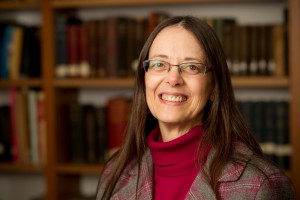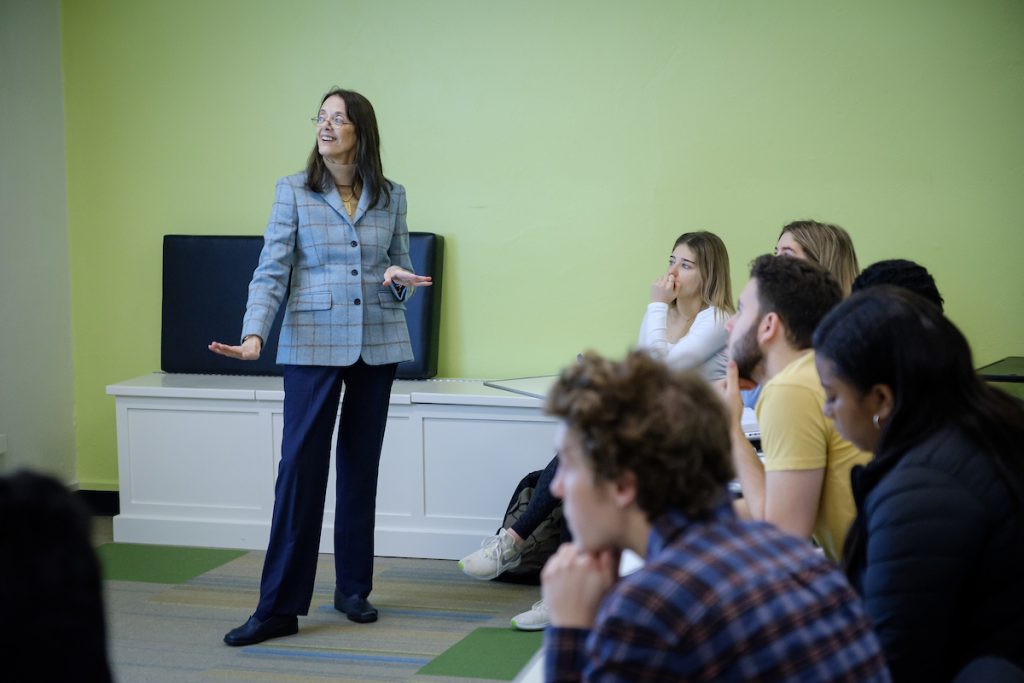Teacher-Scholar Legacies: Darlene May
By Michaelle Browers, Professor and Chair of the Department of Politics and International Affairs
 Darlene May came to Wake Forest University in 2005, after what she jokes was “the world’s longest maternity leave” from her tenured position at Rhodes College in Memphis. After 23 years raising her two sons, a decade of which was spent in Egypt, May quickly set about the task of familiarizing herself with new teaching methods and new textbooks, dove into workshops, and began building connections with Arabic language teachers across the country in order to undertake what she describes as “a really exciting teaching challenge” and “opportunity to develop as a teacher.” May started the Arabic program as the sole instructor of the language, teaching one and a half classes, with only about a dozen or so students. Today the minor offers four full years of modern standard Arabic, from beginning to advanced, as well as regular courses in Arabic literature and culture and occasional courses in various colloquial Arabic languages. In addition to May’s position as a full-time Teaching Professor, the program faculty includes a tenure-track professor and a Fulbright Arabic Language Teaching Assistant.
Darlene May came to Wake Forest University in 2005, after what she jokes was “the world’s longest maternity leave” from her tenured position at Rhodes College in Memphis. After 23 years raising her two sons, a decade of which was spent in Egypt, May quickly set about the task of familiarizing herself with new teaching methods and new textbooks, dove into workshops, and began building connections with Arabic language teachers across the country in order to undertake what she describes as “a really exciting teaching challenge” and “opportunity to develop as a teacher.” May started the Arabic program as the sole instructor of the language, teaching one and a half classes, with only about a dozen or so students. Today the minor offers four full years of modern standard Arabic, from beginning to advanced, as well as regular courses in Arabic literature and culture and occasional courses in various colloquial Arabic languages. In addition to May’s position as a full-time Teaching Professor, the program faculty includes a tenure-track professor and a Fulbright Arabic Language Teaching Assistant.
May’s approach to teaching Arabic draws on her training in Arabic linguistics. “Linguistics gave me that framework I needed to really understand how Arabic works as a language and then to be able to explain that to students in a simple way. Most textbooks in the field just ask students to use the language but not necessarily with understanding why they are, for example, constructing a sentence in a particular way.” May compares Arabic to algebra, due to its logical but complex grammatical structure; she finds it easier to learn and master if you can see how the parts work and fit together. Her approach to teaching is focused on cuing students to bring out the answers themselves, and she often asks the entire class to go to the blackboard at once to dictate or conjugate so she can give them immediate feedback. This combination of actively speaking and writing with immediate feedback — something that she has missed sorely during pandemic restrictions — is how she works to instill good Arabic habits, something she much prefers to trying to undo back Arabic habits that develop with less of a hands-off approach.
As someone who has developed such a successful teaching career, not once but twice in her extensive academic career, one might expect May to be ready to retire. Yet, in the most recent years, she seems to have, if anything, expanded the ways in which she engages in teaching and campus life. In just the last three years alone, her involvement has included her time as Faculty Fellow at Luter Residence Hall; her participation on the Residential College Steering Committee, the Learning Spaces Committee, and the Teaching Professional Promotion Committee; and becoming a founding member of the University’s chapter of Every Campus a Refuge, which assists our local refugee community. May cites her “personal relationships with students” through mentoring them as Arabic speakers and in their individual research as the “the thing that makes it difficult to retire.” “This is,” May says, “what has kept me coming back every year: the opportunity to connect in a deep and meaningful way with these wonderful students that we have at Wake Forest.”

“Linguistics gave me that framework I needed to really understand how Arabic works as a language and then to be able to explain that to students in a simple way. Most textbooks in the field just ask students to use the language but not necessarily with understanding why they are, for example, constructing a sentence in a particular way.”
Darlene May
May is well-known among Arabic students for her willingness to do whatever it takes for her students to succeed. As Savarni Sanka, a recipient of the Rhodes Scholarship, recounts, “that included carving out time between her many meetings to coach me through difficult Arabic texts, encouraging me to apply for a Critical Language Scholarship, creating an Arabic independent study for me when I returned from the program, finding a professor to teach me Arabic in Salamanca, and so much more.” Sanka’s experience also attests to May’s commitment to the whole student: “I’ll remember fondly the newspaper clippings she brought me about local Salvadoran restaurants (because she knew I loved Latin American cuisine); the trip she took with me and my friends to watch a Bollywood film; and the hours she invested in SAFAR, Chai Chat, and other student initiatives I was involved in that she wanted to support. She was an integral part of my college experience and will always be one of the shining lights of the Arabic department!”
May’s other high point of her career at Wake Forest was her promotion to full Teaching Professor. May recounts how surprised she was at how deeply satisfying she found that accomplishment, likening it to how she felt after submitting and defending her dissertation and receiving her Ph.D. “I feel complete after receiving that promotion. It’s an acknowledgement of all the time and effort and passion I have put into this field that I really love,” she said.
I have had the pleasure of working with Darlene May from almost the very beginning of her time at Wake Forest, where I have served alongside her in developing the Arabic program, study abroad programs in Morocco and Egypt, and Every Campus A Refuge. We have shared countless meals and stories along the way. What stands out the most to me is her passion for her work, the high standards she always set for herself, and her patience and generosity in bringing out the best in all of those around her. I am so grateful to continue to reap the gifts of the legacy she bestowed on us when she made her magnificent return to academia to help establish the Arabic Language Program at Wake Forest University, for she has touched so many lives during her time here.
“She was an integral part of my college experience and will always be one of the shining lights of the Arabic department!”
Savarni Sanka (’21), Rhodes Scholar

